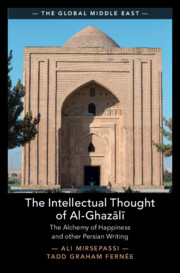Book contents
- The Intellectual Thought of Al-Ghazālī
- Reviews
- The Global Middle East
- The Intellectual Thought of Al-Ghazālī
- Copyright page
- Contents
- Acknowledgments
- Note on Transliteration
- Introduction
- 1 The Time and Life of Ghazālī
- 2 Reading Ghazālī in the West
- 3 The Poetic Imagination and the Politics of Ambiguity
- 4 The Troubled Orthodoxy in the Academic Study of Islam
- 5 A Path to Reform
- 6 A Cosmopolitan Reading of Ghazālī
- 7 Ghazālī’s Practical Ethics
- Bibliography
- Index
Introduction
Published online by Cambridge University Press: 16 January 2025
- The Intellectual Thought of Al-Ghazālī
- Reviews
- The Global Middle East
- The Intellectual Thought of Al-Ghazālī
- Copyright page
- Contents
- Acknowledgments
- Note on Transliteration
- Introduction
- 1 The Time and Life of Ghazālī
- 2 Reading Ghazālī in the West
- 3 The Poetic Imagination and the Politics of Ambiguity
- 4 The Troubled Orthodoxy in the Academic Study of Islam
- 5 A Path to Reform
- 6 A Cosmopolitan Reading of Ghazālī
- 7 Ghazālī’s Practical Ethics
- Bibliography
- Index
Summary
This investigation of Ghazālī’s life and thought is contextualized within the social and intellectual dynamics of the expanding Abbasid Empire of the philosopher’s lifetime. This close contextualization refutes prevailing Islamist and postmodernist readings of Ghazālī that decontextualize his thought in the service of ideological predilection. We use Persian sources to show how Ghazālī’s Islam revolutionized language, creating an accessible discourse intended to transcend the narrow ulema and madrasa milieu that had been in Arabic. Ghazālī’s Islam created an autonomous space for nonreligious sciences, notably logic and mathematics, as part of a reformist project responding to the Abbasid crisis of governance. This reformist discourse, based on the din/donya duality, helped to create an Islamic worldview suited to an expanding multi-civilizational society that depended on new economic and technological ensembles to flourish and survive.
- Type
- Chapter
- Information
- The Intellectual Thought of Al-Ghazālī , pp. 1 - 16Publisher: Cambridge University PressPrint publication year: 2024

